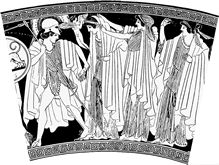Persuasion in Ancient Greece
Andrew Scholtz, Instructor
Overview of Course
COURSE FOCUS: Peitho ("pay-THOE") is the Greek word for persuasion, the influencing of future action and thought. Yet peitho, as object of cult, a figure of myth, and an essential element in love, marriage, and commerce, meant more to Greeks than simply words designed to change minds. Peitho was in fact a central, if ambiguously valorized, feature of ancient Greek culture, and the study of it in context will open a window into the cultural-ideological landscape within which ancient Greeks conceptualized their politics, society, and much else as well.
BY TAKING THIS COURSE, you should expect to be challenged on a number of levels. First and foremost, you'll be digging deep into the processes of persuasion, how words and feelings, sights and sounds, can alter perceptions, change attitudes, and affect behaviors. Second, you'll be considering the relationship between persuasion and one particular form of government: democracy. Your laboratory: ancient Greek democracy (especially Athenian democracy) and ancient writings shedding light on the relationship between words and power in that time and place.
So this course should open a window into past worlds, but it should do more. By studying ancient realities, you also gain perspective on modern realities. Not that modern and ancient democracy are the same. But Athenian democracy as a well-defined and manageable focus of study will help you think about bigger issues of the power of words and the ethics of power.

|
| Makron Vase: Paris, Eros, Helen, Aphrodite, Persuasion |
COURSE MATERIALS: The readings and lectures will progress chronologically through the material to be studied, and will move from general considerations to a more narrow focus on the emergence of speech-based democracy at Athens. You'll be dealing with primary (i.e., ancient) texts in English translation (Greek drama, philosophy, oratory, biography, etc. from about 800 BCE through 125 CE), secondary sources, and artistic and archaeological evidence.
COURSE WORK: Two larger papers, shorter writing assignments in fulfillment of the "C" (composition) component. Oral reports, speech-writing/-giving (epidexeixis) (the "O" [oral] component). Reading, discussing, lecture, short fact-based quizzes, readings- and presentations-related journals, discussion. No exams.
GENERAL EDUCATION, ETC.: The course counts toward the General Education "H" requirement (humanities), as a "J" (composition plus oral) course, and as a cognate course in the Philosophy, Politics and Law program (PPL).
